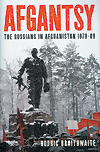
Afgantsy: The Russians in Afghanistan, 1979–89, by Rodric Braithwaite, Oxford University Press, London, 2011, $29.95
With the arrival of the 10th anniversary of American military involvement in Afghanistan, this book is more than timely. Imagine a superpower inserting forces into Central Asia’s notorious “Graveyard of Empires,” with a nearly bloodless initial invasion, thence dedicating itself to modernizing the Afghan state—stressing education, the empowerment of women, ethnic equality and industrial progress—only to find itself in a decade-long bloodbath against a martial, tribal society fighting to preserve medieval-style Islam.
Afgantsy—the Russians’ slang for their Afghan war veterans—provides rare insight into the Soviet experience in Afghanistan, even as it evokes a sense of déjà vu for observers of our current conflict. Author Rodric Braithwaite was Britain’s ambassador to Moscow during the crucial period 1988–92, and his ringside seat on Russian thinking challenges much of the common wisdom long held in the West.
According to Braithwaite, the Soviet Union invaded Afghanistan at Christmas 1979 not to conquer the country but to assist what it considered progressive elements against reactionary uprisings. It hoped to withdraw again just as quickly. When its 40th Army found itself locked in combat in the Afghan countryside, it continually hoped that one more offensive, or one more year, would enable the government in Kabul to survive and prosper.
However, as invaders before and since have found, the true strength of Afghanistan lies not in its cities but in its hills and mountains, against whom few outside invaders have succeeded. Braithwaite expresses sympathy with the Soviets’ plight, even as he condemns the escalating brutality of their methods. Pakistan, then as now, played a huge role in succoring the Afghan resistance against outside invasion, which during the 1980s was almost gleefully supported by the United States, hoping to return the Soviets’ favor for Vietnam. Little did the Americans realize that a decade later they’d be struggling with the exact monster they did much to create.
In Afgantsy Braithwaite dispels myths about the Soviet war in Afghanistan, while providing cautionary lessons for our own. In each case one cannot help but sympathize with the sophisticated powers that intervene in that land with all good intentions but in the end find themselves relying on pure firepower, to which present-day Afghans have never succumbed.
—Stephen Tanner




